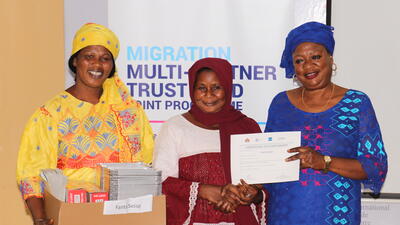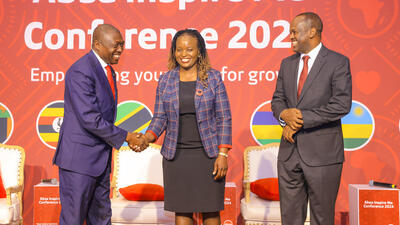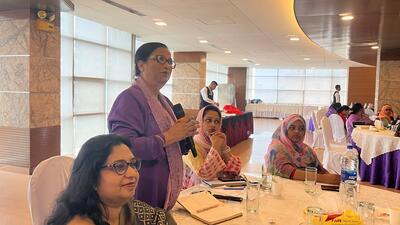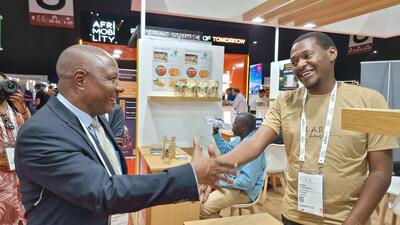Opening government procurement to women’s enterprises
In a little more than a century, 40 women have won the Nobel Prize, and there is a steady improvement in the representation of women in national parliaments worldwide. Women have achieved levels of excellence that indeed have made our world a better place. But these advances cannot hide the fact that, in many parts of the world, women remain economically and socially disadvantaged. Therefore, the promotion of gender equality and empowerment of women has rightly been identified as one of the United Nations Millennium Development Goals. Addressing remaining economic and social inequities requires a fundamental reform of policies both on a national and global level. Trade can and should be part of the solution.
The evidence is clear that trade facilitates job creation and growth, which in turn can alleviate the poverty that disproportionately affects women and their families. A recent study by Jane Korinek from the Organisation for Economic Co-operation and Development (OECD) called Trade and Gender: Issues and Interactions has shown that, in middle-income developing countries, women make up roughly 50%–90% of the workforce in export-oriented sectors of the economy, and these jobs often pay better wages and provide better working conditions than those in other sectors of the market. Not surprisingly, therefore, the International Trade Centre (ITC) has confirmed a strong correlation between increased international trade and increases in female employment. Trade results in greater employment in exports, increased connection to markets and often higher wages in export-oriented industries, particularly for women.
How can this positive impact of international trade on gender equality and socio-economic development be reinforced? Enhanced participation in the international economy by women’s business enterprises (WBEs), that is, enterprises run by and employing women, can provide access to more and better-paying jobs for women. Such enterprises are important vehicles for achieving gender equality and the positive developmental benefits that are associated with it. To reap the maximum benefit from WBEs to improve our societies, we need to generate more and better economic opportunities for them.
It is important not to overlook the opportunities offered by public sector procurement. The sheer size of the global public procurement market speaks for itself: in 2002, the total size of the government procurement sector was estimated to be in the range of 15%–20% of GDP across OECD and non-OECD economies (see The Size of Government Procurement Markets, available at www.oecd.org/dataoecd/34/14/1845927.pdf). These estimates have been corroborated by more recent estimates for developed and developing country economies. Improved access by WBEs to this sector can, therefore, have a direct and positive impact.
The World Trade Organization (WTO) Agreement on Government Procurement (GPA), in particular the revised version of the agreement recently adopted by a group of WTO Members, has the potential to open up significant economic opportunities for under-represented social groups, including WBEs, in this important market segment. It is the world’s principal tool for facilitating trade in relation to government procurement markets, and represents a trade-opening instrument that also recognizes the need for good governance mechanisms, built around the WTO’s fundamental principles of non-discrimination, transparency and procedural fairness. These principles promote both equal access to public procurement markets by all suppliers and better value for money for governments and citizens. They also support WBEs in accessing new business opportunities in the public procurement sector.
On 15 December 2011, a group of WTO ministers agreed on a set of issues relating to the renegotiation of the GPA. This move was confirmed on 30 March 2012 by the WTO Committee on Government Procurement. The decisions made address not only the text and coverage of the revised agreement, but also a future work programme. This means that all elements of the renegotiation have now been agreed and that the revised agreement can enter into force, subject to the submission of instruments of acceptance by GPA parties. This deal has resulted not only in a modernized and improved agreement text, but also in expanded market access opportunities that have been estimated to amount to around US$ 80–US$ 100 billion annually. The future work programme shows that GPA parties remain committed to adapting the agreement to the evolving economic and social environment in which we live.
How, exactly, can the GPA be of assistance to WBEs? WBEs are often newcomers to procurement markets previously dominated by other businesses. A major obstacle they may face in establishing themselves as successful and competitive bidders is that unreformed procurement systems favour incumbent firms (their competitors) through well-established communication channels and cronyism. The GPA’s procedural requirements, in contrast, are designed to open markets: they help create transparent and fair procurement systems, and thereby ensure that WBEs are not kept in the dark about information relating to procurement opportunities. Rather, they must have a fair chance to compete. Importantly, the revised text of the GPA contains explicit obligations to the effect that parties need to prevent conflicts of interest and corrupt practices, which are other factors that may unfairly prevent WBEs from winning contracts. Furthermore, the GPA’s built-in requirement for domestic review of procurement decisions provides WBEs with important fora to voice concerns and address remaining unfair practices that put them at a disadvantage. One of the most important features of the GPA is that WBEs, upon the accession of their country of origin, gain the opportunity to bid on contracts in the markets of other GPA parties. All these factors taken together mean that the GPA is an important tool for WBEs desiring to take advantage of new business opportunities in the public procurement sector.
To be sure, the GPA sets legal limits on some forms of preferential programmes, for example programmes setting aside contracts by discriminating between enterprises on the basis of their home country. Such programmes are not truly conducive to increased participation of WBEs in global procurement markets, as they limit the benefits to national WBEs and national procurement markets. In contrast, measures such as general training courses preparing WBEs for successful participation in national and international procurement (i.e. courses not targeted at specific national tenders), which can be highly supportive for WBEs, are generally permitted. Similarly, where national markets need to be used as ‘stepping stones’ to increased participation in international procurement markets later, it is important to note that the GPA only applies to procurement whose value exceeds the threshold levels defined in the GPA. As those thresholds are relatively high, this means that many lower value contracts that may potentially be attractive to smaller WBEs are not subject to the GPA’s rules.
Finally, even where non-WBEs win important above-threshold contracts as the outcome of transparent and open tendering procedures, it is important to keep in mind that this does not mean there is no business opportunity for WBEs or a complete lack of impact on gender equality: WBEs can still be encouraged and equipped with the means to bid for subcontracts, thereby learning from other firms and increasing their expertise. Furthermore, the efficient use of public resources achieved through open and transparent procurement can be expected to have a positive impact on gender equality and development through other channels, for example because it permits the government to build more hospitals, schools and other facilities needed to improve women’s lives and strengthen their participation in society. Therefore, the GPA and compliance with it is beneficial to the participation of WBEs in public procurement, to gender equality, and to economic and social development.
Today 14 WTO Members (counting the European Union as one) are parties to the GPA. There is therefore a great potential for many other Members — particularly developing countries — to join the agreement. China, Jordan, Panama, Ukraine and several other developing economies are in the process of negotiating their accession to the GPA. India, Colombia, Turkey and several other WTO Members are looking at the potential benefits and costs of joining.
In my capacity as Director-General of the WTO, I am personally committed to helping governments devise trade policies that enable women to play a more prominent role in the global economy. I believe the WTO’s GPA can be a very helpful policy tool for this purpose. Its recent, successful renegotiation, modernizing the agreement and enhancing the market access provided under it, has shown the dynamic and progressive approach GPA parties take in using the agreement to enhance the economic welfare of their country. Its potential to enhance the participation of WBEs in international procurement markets and promote gender equality and good results for development should not, therefore, be overlooked.















